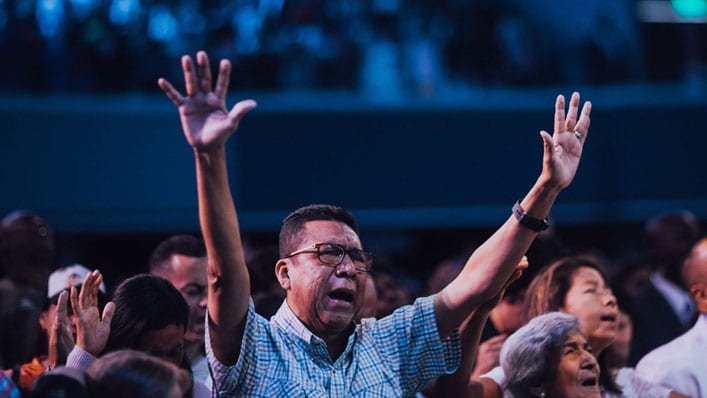Dear Charismatic Christians

I was lying in my dorm room bed at Moody Bible Institute a few months after arriving there, listening to a sermon from Timothy Keller. He had long been one of my favorite preachers, but one thing that’s true of humans everywhere is this: you don’t realize what you disagree with them on until it comes up.
“I’d consider myself an 80% cessationist,” Keller said at one point in the message. (A cessationist is someone who believes the spiritual gifts have ceased.) “I believe that about 20% of what people report actually happens and is from God. The rest I think is emotional excitement or mental placebo.”
Aw man! I thought. I thought Tim Keller was cool! How can one of the best preachers be so wrong??
I wasn’t just a little charismatic, I was all in.
I led a street prayer ministry the whole time I was at Moody, and we often prayed for supernatural miracles. And I saw a couple. I was in Nigeria, Brasil, Thailand, India, and more with very charismatic organizations. We saw supernatural things: most prominently, a demon cast out of a Thai farmer. And despite how often we prayed for miracles to happen, that’s one of the few real ones I ever saw.
There were a lot of times we celebrated a healing of someone’s back because their pain had instantly disappeared, only to return a few hours later. We would often pray for a local (who didn’t know English) and they would nod that their knee was healed, probably just to get these weird kids to stop touching their leg.
I was even caught up in the ‘penny trick,’ where you pray for God to hold a penny to a wall or ceiling. I remember Kim Walker explaining that it’s like lifting weights in the gym: it doesn’t accomplish anything in and of itself, but it strengthens your faith. Most of the time it was just the moisture from the paint holding it up, but there was one time I saw a penny hold fast to a slanted, dry ceiling which was strange.
All that is to say, I wasn’t just a casual charismatic believer; I was in it. Miracles and supernatural events were my bread and butter, and when they didn’t happen, there was grave disappointment. My fledgling theology didn’t know how to make sense of a God who didn’t show up, say, 80% of the time…
Despite the tone of this article, I want to be clear: I love YWAM, IHOP, OM, et al and the passion and zeal of the charismatic movement. I grew so much during my time with them and know they are doing SO much good around the world, advancing the gospel of Jesus in places it needs to go. The purpose of this post is to encourage charismatic brothers and sisters to see a few things I’ve realized and learned after living outside of that circle, which you may not otherwise be exposed to. Diving deep into history, philosophy, and other strains of evangelical theology has taught me more than I ever got from any ‘prophecy’ (save one at OneThing conference 2014 from a dude named Sam, again proving the point that very few events were actually of the Spirit…but some certainly were). It has helped my faith and love for God grow, not diminish.
Adjusting to life at Moody as a charismatic was a tough transition: in some ways MBI is the opposite end of the spectrum—I had some professors tell me that I had never, in fact, seen a miracle and it was all in my imagination. I had a group of fellow former YWAMers and we would gather and worship and pray, and this was great.
However, it was over my three years at Moody that my knowledge would expand, thus adjusting my view of miracles and supernatural activity. It didn’t remove it completely, but it balanced it. It’s a mistake to think that non-charismatic believers are anti-Holy Spirit. Granted, some are, but just because I don’t consider myself ‘charismatic/pentecostal’ doesn’t mean I think God cannot still do miraculous, supernatural things. Let me explain.
I always return to John 4:23-4, where Jesus tells us that worshipers worship ‘in spirit and truth.’ You need both in order to survive as a Christian, and I tell folks that I got the spirit from YWAM and the truth from Moody (and now Denver Seminary).
If you have the truth but no spirit, your religion quickly becomes dry, legalistic rule following. Often it is this side of Christianity that is critiqued more for being ‘Pharisees and judgmental legalists,’ which is fair, but what about the other extreme?
If you only have spirit but no truth, cults are formed and anything someone says goes as long as you seem to be ‘led by the Spirit.’ As the charismatic/pentecostal movement becomes the fastest growing branch of Christianity worldwide, we need to be sure that we are balancing our spirit with truth, not allowing our members to spin off into wild theological quandaries which may sound spiritual, but have little to no biblical precedent. (This is the side of the pendulum this article is focusing on; I know there is much to be said for the other extreme as well, but that’s for another day.) Even prominent charismatic scholar Craig Keener has admitted that charismatic believers need to become more educated, not following every wind of prophecy. I’m not just talking about damaging practices like forced speaking in tongues, I’m talking about even deeper beliefs which would lead to practices like that.
Take, for instance, the recent tragic episode of a Bethel worship leader trying to raise her daughter from the dead: without going into the details of the story itself, a lot of Bible verses were thrown around out of context in order to prove one side’s point. This is obviously a detrimental way to build arguments and do hermeneutics no matter which side you’re on. This heartwrenching event served to expose a lot of the beliefs of the charismatic church and the grounds upon which they build their theology.
Many people filled comment sections with Bible verses yanked out of context, not realizing that the other ‘side’ could just as easily yank a different verse to prove another point. Thus, it’s impossible to argue with someone who is throwing little pebbles of individual Bible verses in lieu of a larger structure on which to build their theological arguments.
Think of it like this: before I went to Moody, I had a string of small arguments strung together through various anecdotes or quotes from pastors’ sermons. I didn’t have much of a foundational theology on which I built the core of my beliefs. I had a series of small, adjacent city-states rather than a massive nation to draw resources from. And which is more sturdy—small clusters of thoughts, or massive, deep-rooted, well-established doctrine and belief?
That’s the impression I got reading a lot of comments on this event: People were pitching little verses like Matthew 10:8, where Jesus tells His disciples to raise the dead…all the while neglecting that in the same paragraph, He instructed them not to go among the gentiles. Clearly that imperative was meant for only that specific group at that time.
Others would talk about how, when Jesus died, many dead people got out of their graves, and use this as justification for why people can be raised no matter how long they’ve been dead. However, they left out the part that Jesus died when this happened. Clearly it wasn’t a regular thing. There’s a difference between prescriptive and descriptive passages of scripture and it’s important to delineate between the two.
Someone from the other side could just as easily have quoted Isaiah (“Those who go down to the pit cannot hope for your faithfulness”), or Ecclesiastes (“The dead know nothing; they have no further reward…never again will they have a part in anything that happens under the sun.)
My point is not to argue for one side or the other, but to show that this method of building an argument is fundamentally flawed and it actually proves a lack of larger biblical/theological understanding. If one’s theology is pieced together with scraps of scripture apropos to the situation, that structure cannot stand when stronger, more robust arguments are presented, arguments which are not as dependent on the current situation.
The issue with building your beliefs on the foundation of miracles and supernatural occurrences—as I did for years—is that when they don’t happen, you are left with some anemic view of God. A better view of miracles would be thinking of them as sprinkles on the cake: they are not the substance or the core of my belief, but if they happen, they are sweet and we get to rejoice and praise God together.
Of course, no charismatic person would say that they’ve built their system on top of miracles, but to be honest, that really was the driving force of my faith for many years. And movies like Finger of God and Furious Love—favorites among pentecostals—only serve to reinforce this culture of ‘miracle hunters.’ It almost felt like my faith wasn’t good enough because I didn’t see healings left and right as people like Todd White claim to. Again, I don’t think their hearts are insidious, or that they’re intentionally trying to mislead people; but this pursuit of spirit needs to be balanced out by a pursuit of truth.
Perhaps a deeper understanding of miracles and scripture would help round out the times God doesn’t heal the leg, or eradicate the cancer. A sound theology of suffering will help comfort us in times of suffering. After all, it’s tempting to bypass passages about ‘taking up our cross daily’ in favor of those promising God giving us what we ask for, building anemic theologies of ‘open heavens’ and other false hopes for salvation in this life. Much of this, I eventually realized, was flat-out denial of reality. I can’t count the number of times my sinuses were ‘declared’ healed before I actually had surgery on them.
Perhaps charismatic brothers and sisters need to balance out their doctrine of resurrection with a healthy cruciformity: seeing life through the lens of the cross. After all, we are still in the Golgotha phase of our existence. It hurts and we suffer and die. Resurrection has yet to happen to us.
(There needs to be a balanced notion of “already but not yet” when thinking about the kingdom. Many preachers emphasize the “already” portion of the kingdom, leading them into overrealizing their eschatology which inevitably leads to health and wealth gospels contrary to the Bible. It needs to be balanced out with “not yet”: the kingdom is not here in its fullness and we live in a very broken world. But again, that’s a post for another day.)
After all, if we hope for miracles in this life, even if they come, we will ultimately be let down. One speaker at Moody once shifted my perspective when he said:
“You know what the greatest miracle of all is? Salvation. All other miracles are temporary. If your knee gets healed, it will eventually break down again. Even Lazarus died again.”
Neglecting this as the center of Christian faith and hope will always disappoint us. What good is rejoicing at a miracle if it will one day inevitably be undone? This is why the core of our faith must always continue to be unio Cristi, knowing Christ as He is and introducing others to Him. This means explaining that their life won’t get better just because they know Him. In many cases, it will get much worse, yet Jesus did not leave His followers unprepared for this. “In this world, you will have trouble, but take heart, I have overcome the world.”
Our hope is not that this world will bring healing, or that it will satisfy us. Our hope is that Christ is with us, that He has us in His mighty hand, and will not let us go. May we not get sidetracked by focusing on temporary miracles, but continually focus on the one that will not end: knowing Christ and Him crucified, joining Him in His suffering that we may one day, somehow, join Him in His resurrection.



